Police Officer Resume Examples

Mar 31, 2025
|
12 min read
Unleash your full potential with a standout police officer resume that leaves no case unsolved. Discover the do's and don’ts, avoid rookie mistakes, and ensure your qualifications don't remain a mystery to potential employers.
Rated by 348 people
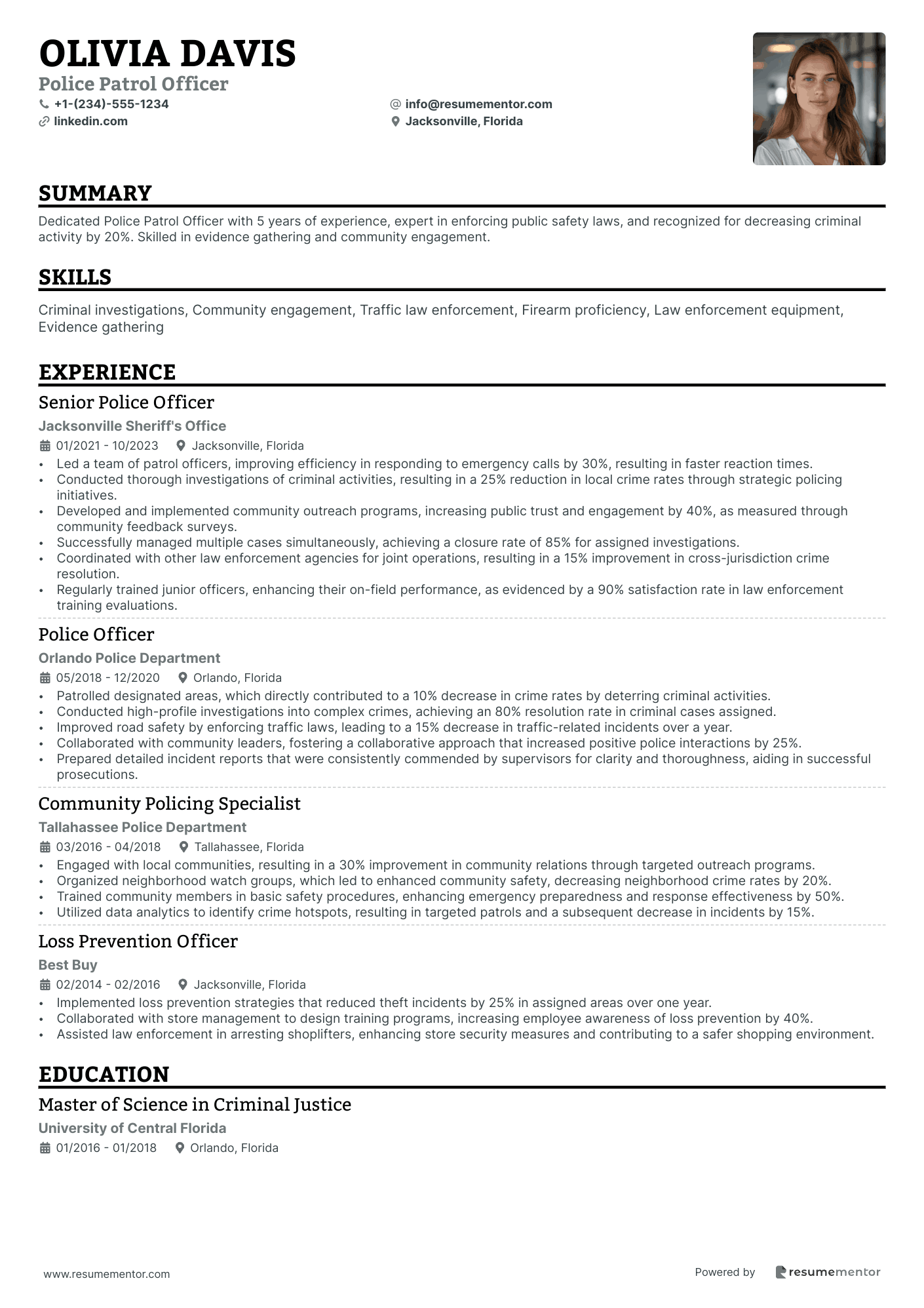
Police Patrol Officer
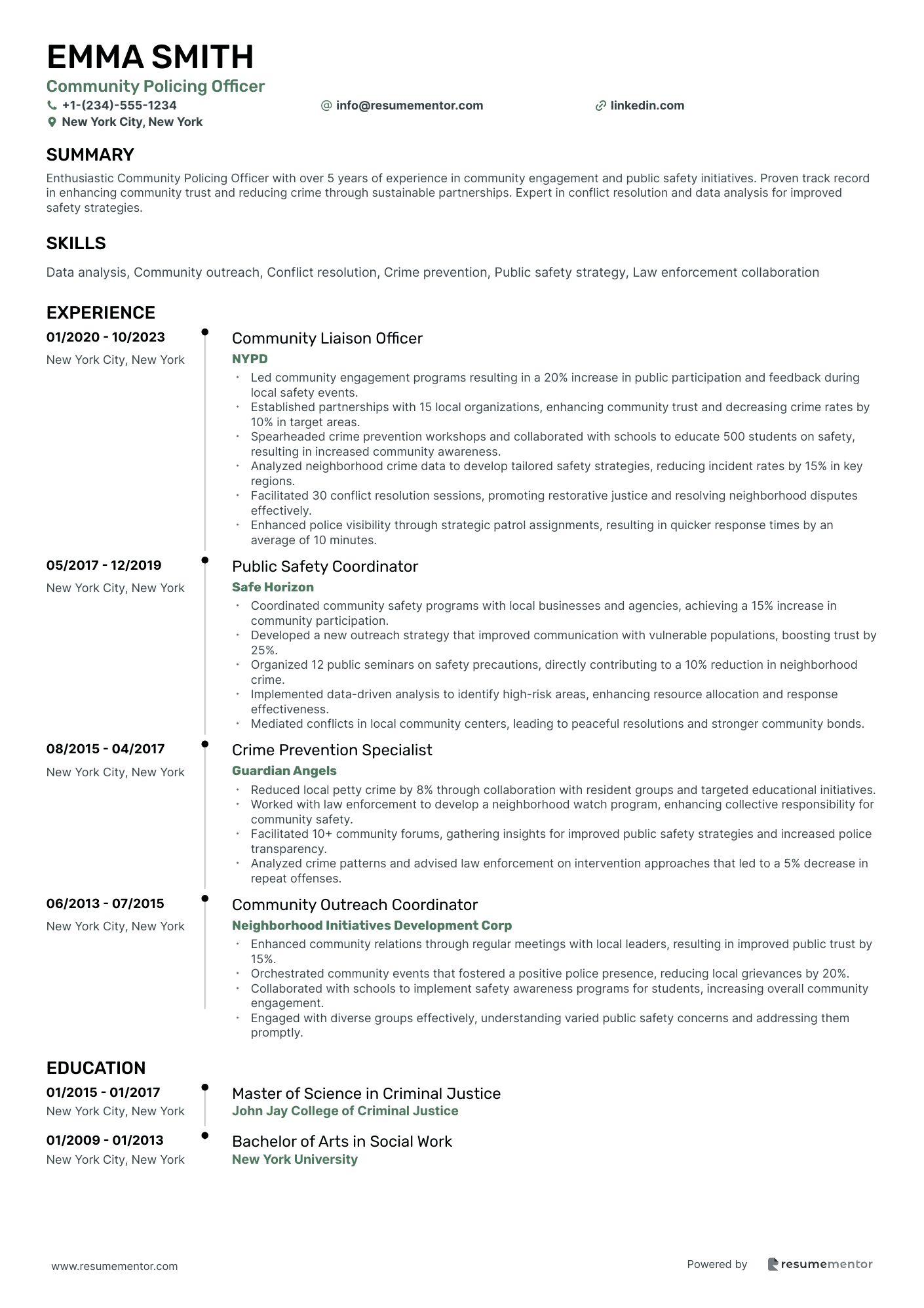
Community Policing Officer
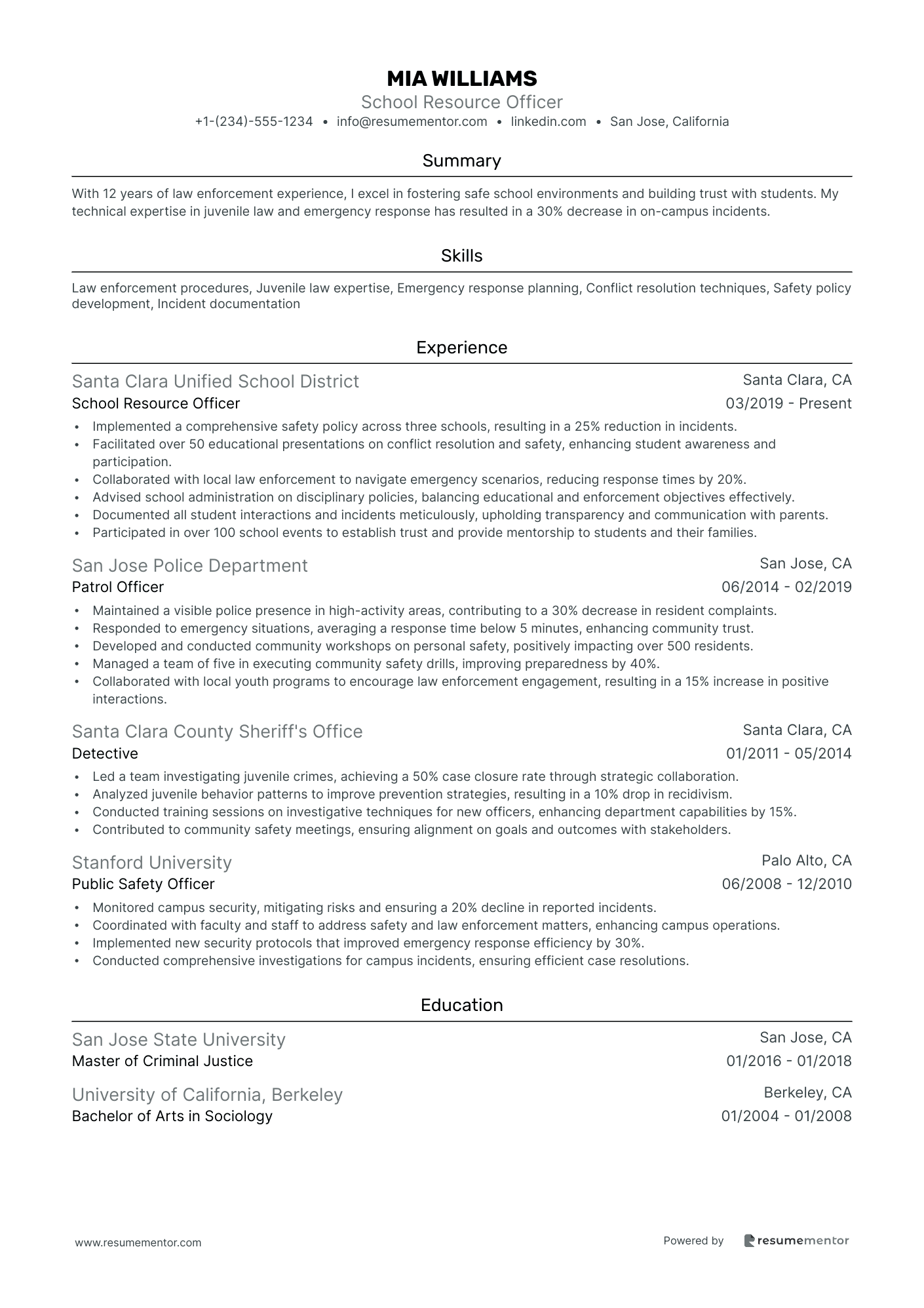
School Resource Officer
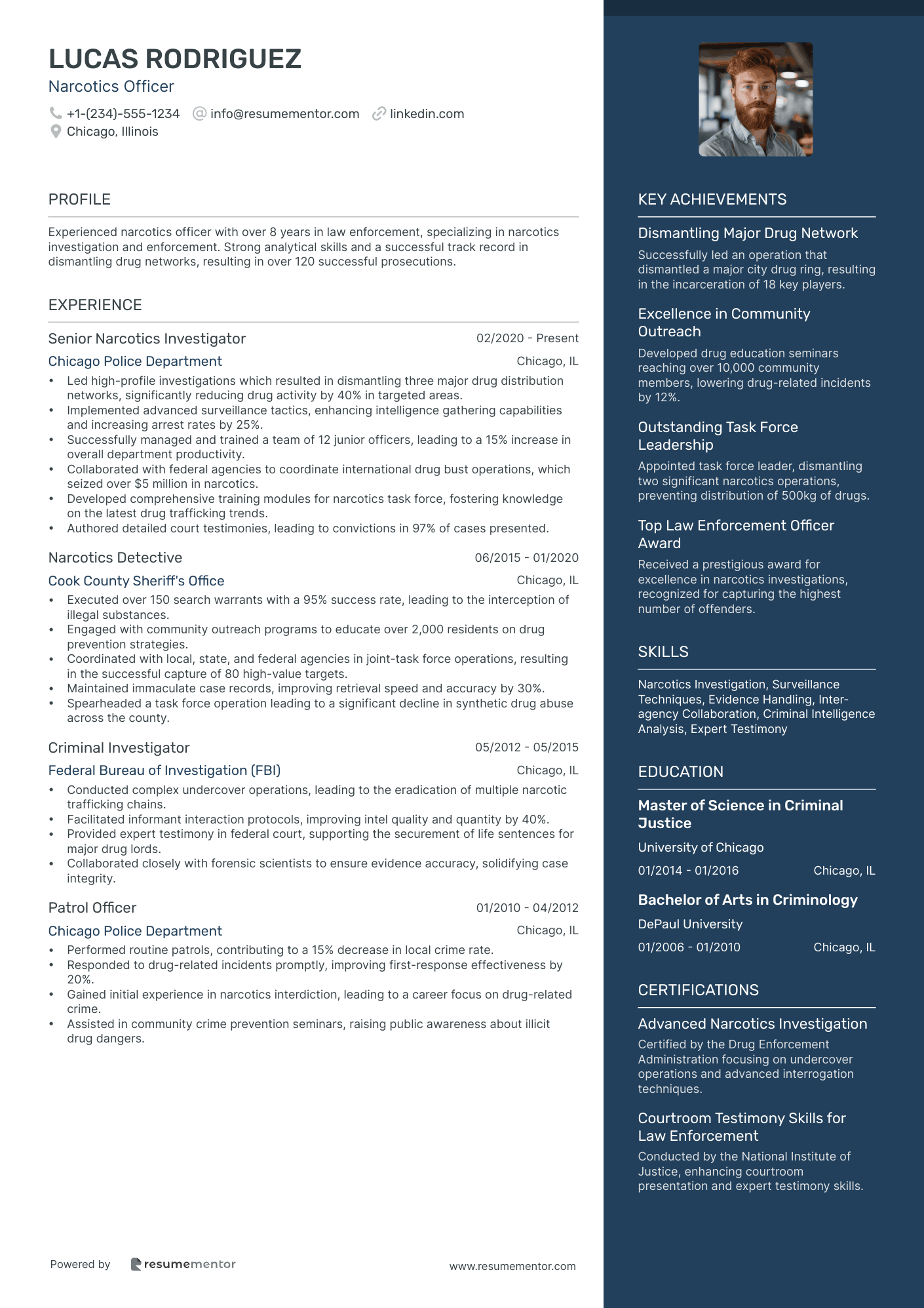
Narcotics Officer
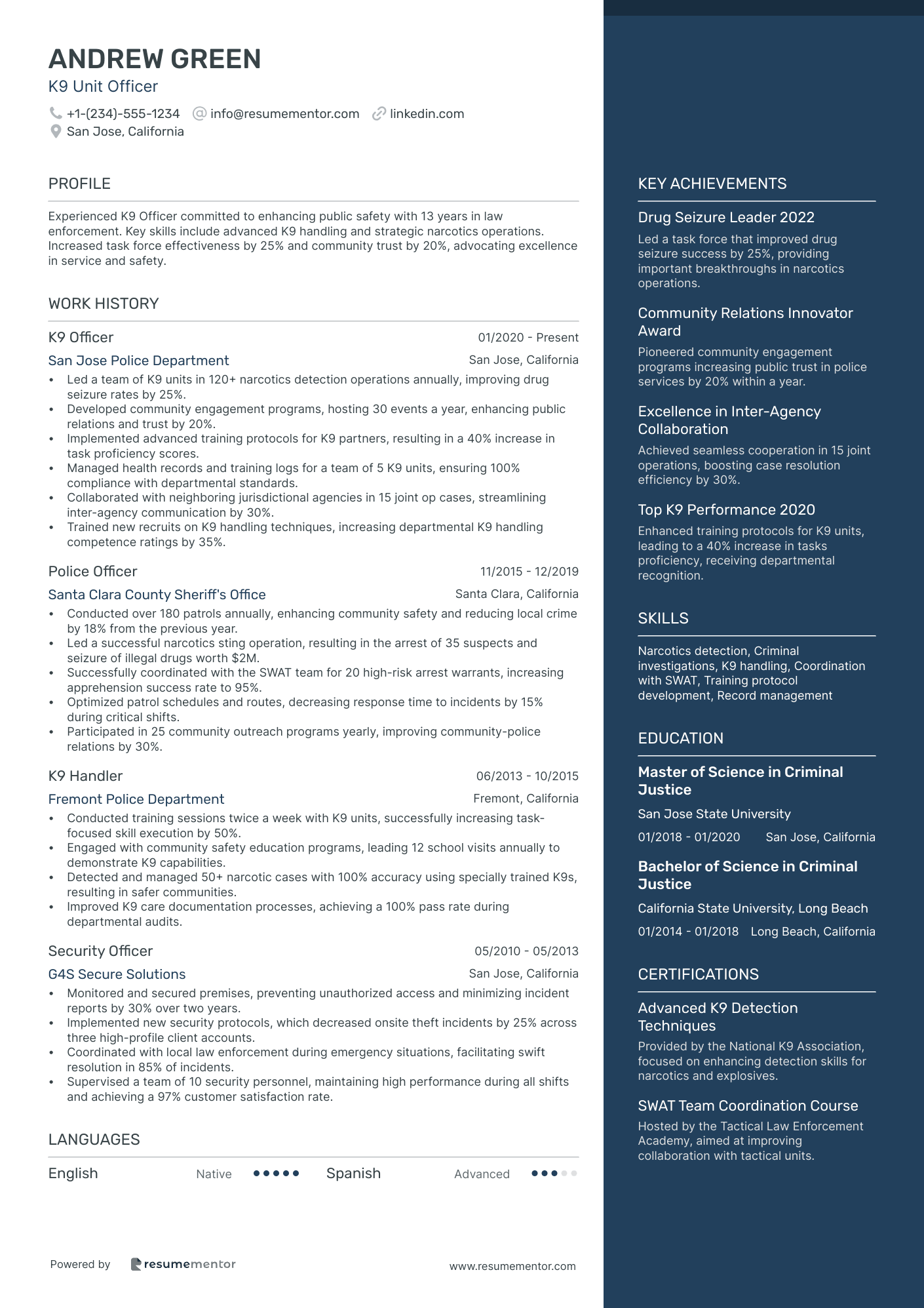
K9 Unit Officer
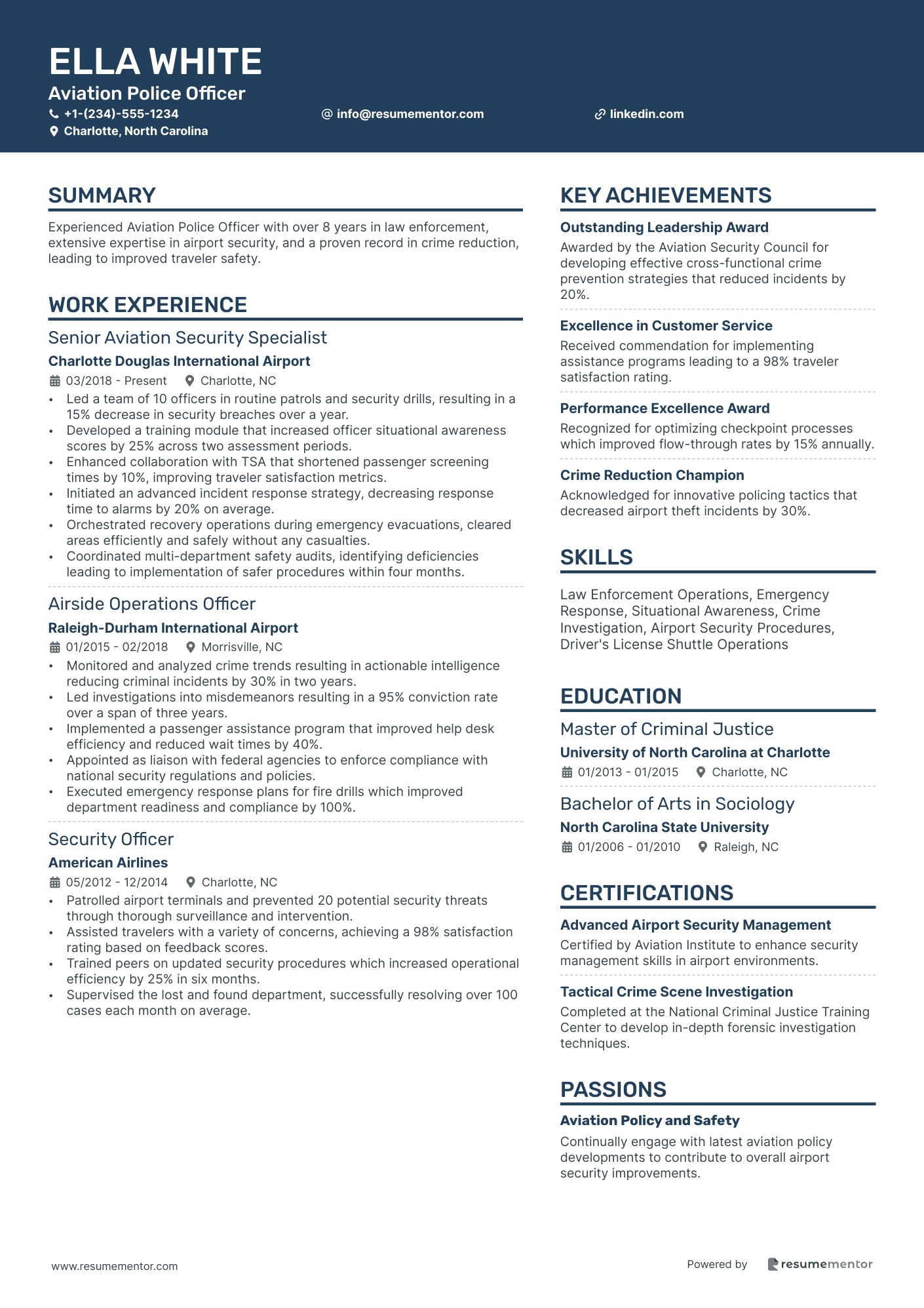
Aviation Police Officer
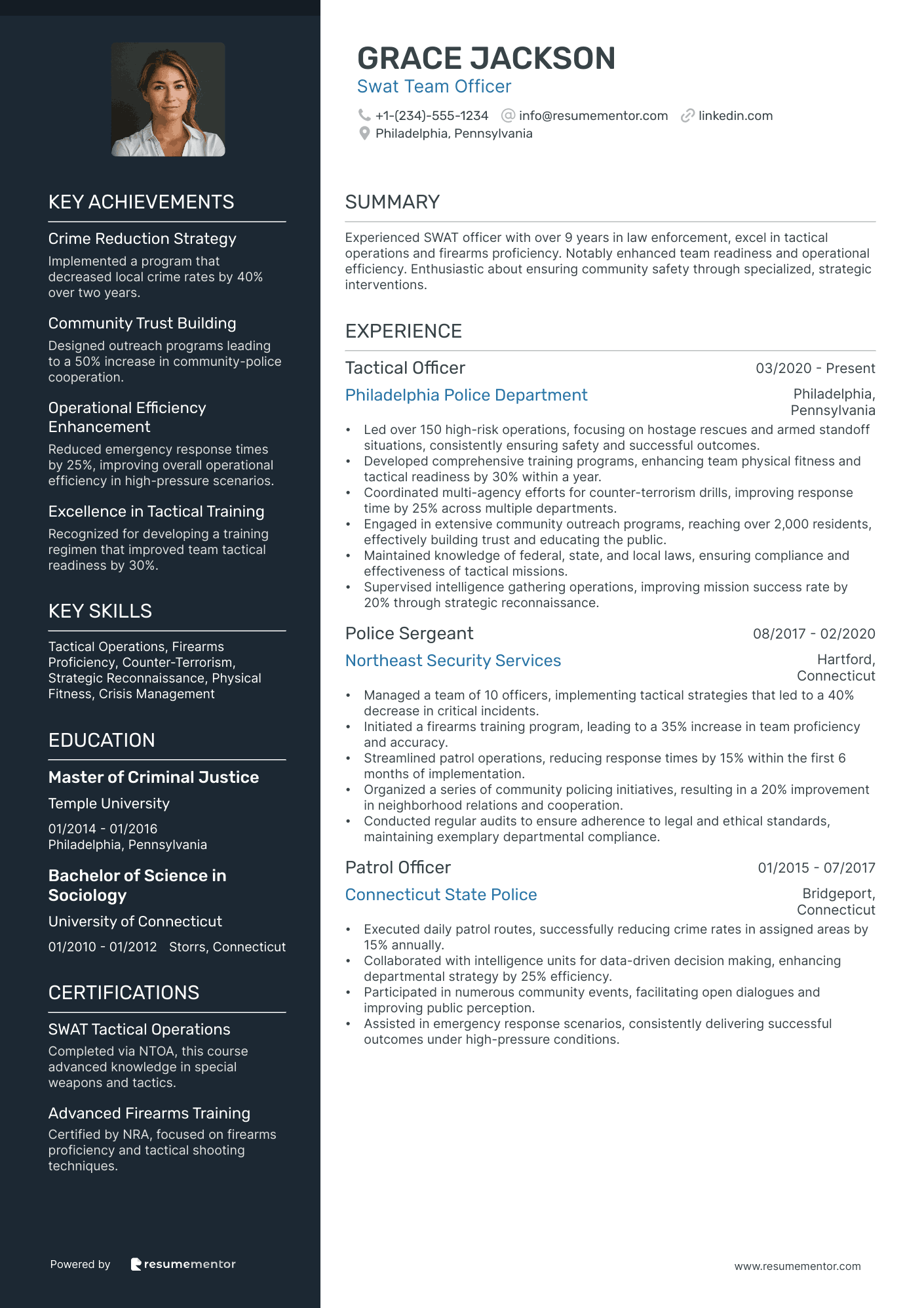
Swat Team Officer
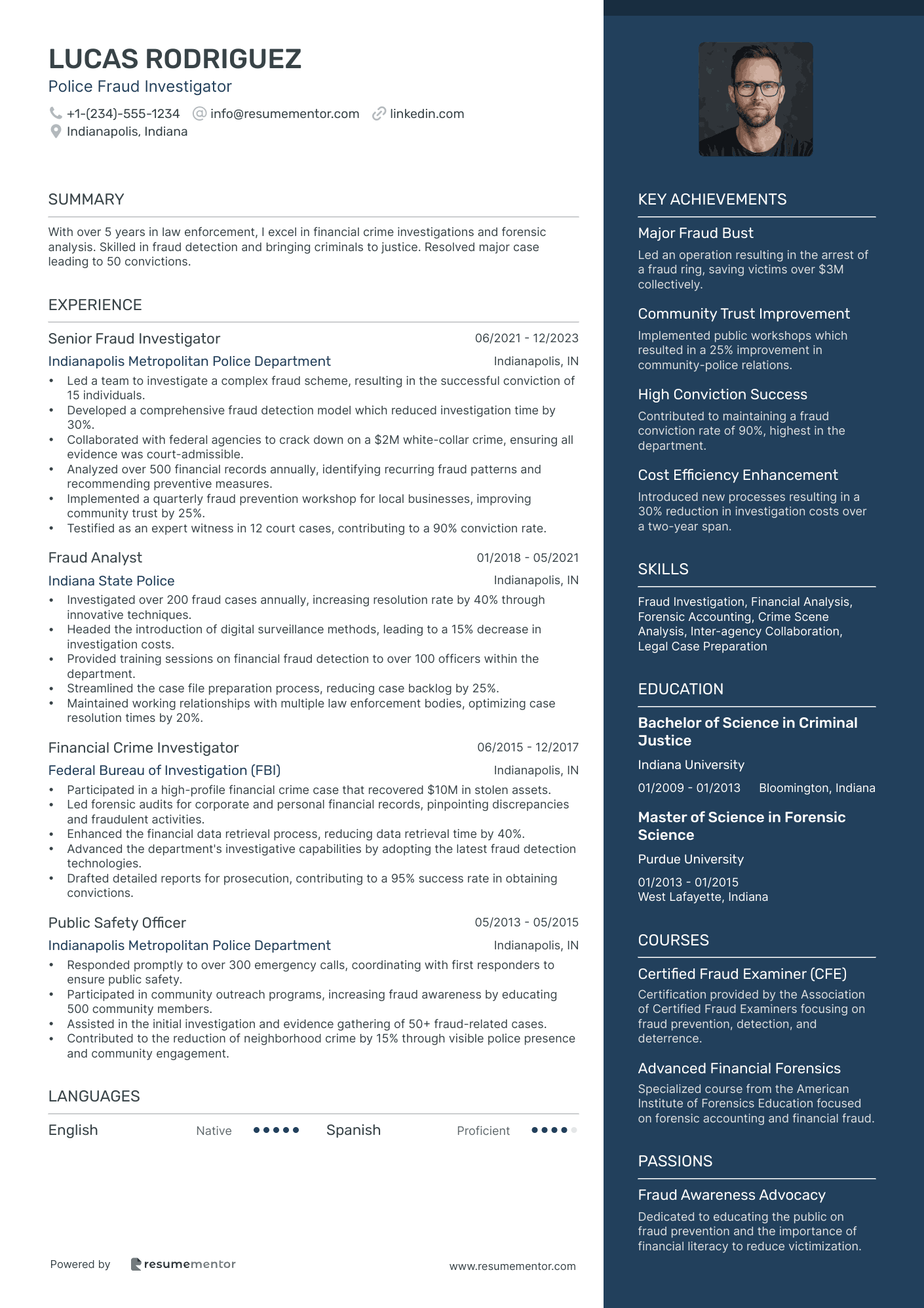
Police Fraud Investigator

Police Patrol Officer resume sample
- •Led a team of patrol officers, improving efficiency in responding to emergency calls by 30%, resulting in faster reaction times.
- •Conducted thorough investigations of criminal activities, resulting in a 25% reduction in local crime rates through strategic policing initiatives.
- •Developed and implemented community outreach programs, increasing public trust and engagement by 40%, as measured through community feedback surveys.
- •Successfully managed multiple cases simultaneously, achieving a closure rate of 85% for assigned investigations.
- •Coordinated with other law enforcement agencies for joint operations, resulting in a 15% improvement in cross-jurisdiction crime resolution.
- •Regularly trained junior officers, enhancing their on-field performance, as evidenced by a 90% satisfaction rate in law enforcement training evaluations.
- •Patrolled designated areas, which directly contributed to a 10% decrease in crime rates by deterring criminal activities.
- •Conducted high-profile investigations into complex crimes, achieving an 80% resolution rate in criminal cases assigned.
- •Improved road safety by enforcing traffic laws, leading to a 15% decrease in traffic-related incidents over a year.
- •Collaborated with community leaders, fostering a collaborative approach that increased positive police interactions by 25%.
- •Prepared detailed incident reports that were consistently commended by supervisors for clarity and thoroughness, aiding in successful prosecutions.
- •Engaged with local communities, resulting in a 30% improvement in community relations through targeted outreach programs.
- •Organized neighborhood watch groups, which led to enhanced community safety, decreasing neighborhood crime rates by 20%.
- •Trained community members in basic safety procedures, enhancing emergency preparedness and response effectiveness by 50%.
- •Utilized data analytics to identify crime hotspots, resulting in targeted patrols and a subsequent decrease in incidents by 15%.
- •Implemented loss prevention strategies that reduced theft incidents by 25% in assigned areas over one year.
- •Collaborated with store management to design training programs, increasing employee awareness of loss prevention by 40%.
- •Assisted law enforcement in arresting shoplifters, enhancing store security measures and contributing to a safer shopping environment.
Community Policing Officer resume sample
- •Led community engagement programs resulting in a 20% increase in public participation and feedback during local safety events.
- •Established partnerships with 15 local organizations, enhancing community trust and decreasing crime rates by 10% in target areas.
- •Spearheaded crime prevention workshops and collaborated with schools to educate 500 students on safety, resulting in increased community awareness.
- •Analyzed neighborhood crime data to develop tailored safety strategies, reducing incident rates by 15% in key regions.
- •Facilitated 30 conflict resolution sessions, promoting restorative justice and resolving neighborhood disputes effectively.
- •Enhanced police visibility through strategic patrol assignments, resulting in quicker response times by an average of 10 minutes.
- •Coordinated community safety programs with local businesses and agencies, achieving a 15% increase in community participation.
- •Developed a new outreach strategy that improved communication with vulnerable populations, boosting trust by 25%.
- •Organized 12 public seminars on safety precautions, directly contributing to a 10% reduction in neighborhood crime.
- •Implemented data-driven analysis to identify high-risk areas, enhancing resource allocation and response effectiveness.
- •Mediated conflicts in local community centers, leading to peaceful resolutions and stronger community bonds.
- •Reduced local petty crime by 8% through collaboration with resident groups and targeted educational initiatives.
- •Worked with law enforcement to develop a neighborhood watch program, enhancing collective responsibility for community safety.
- •Facilitated 10+ community forums, gathering insights for improved public safety strategies and increased police transparency.
- •Analyzed crime patterns and advised law enforcement on intervention approaches that led to a 5% decrease in repeat offenses.
- •Enhanced community relations through regular meetings with local leaders, resulting in improved public trust by 15%.
- •Orchestrated community events that fostered a positive police presence, reducing local grievances by 20%.
- •Collaborated with schools to implement safety awareness programs for students, increasing overall community engagement.
- •Engaged with diverse groups effectively, understanding varied public safety concerns and addressing them promptly.
School Resource Officer resume sample
- •Implemented a comprehensive safety policy across three schools, resulting in a 25% reduction in incidents.
- •Facilitated over 50 educational presentations on conflict resolution and safety, enhancing student awareness and participation.
- •Collaborated with local law enforcement to navigate emergency scenarios, reducing response times by 20%.
- •Advised school administration on disciplinary policies, balancing educational and enforcement objectives effectively.
- •Documented all student interactions and incidents meticulously, upholding transparency and communication with parents.
- •Participated in over 100 school events to establish trust and provide mentorship to students and their families.
- •Maintained a visible police presence in high-activity areas, contributing to a 30% decrease in resident complaints.
- •Responded to emergency situations, averaging a response time below 5 minutes, enhancing community trust.
- •Developed and conducted community workshops on personal safety, positively impacting over 500 residents.
- •Managed a team of five in executing community safety drills, improving preparedness by 40%.
- •Collaborated with local youth programs to encourage law enforcement engagement, resulting in a 15% increase in positive interactions.
- •Led a team investigating juvenile crimes, achieving a 50% case closure rate through strategic collaboration.
- •Analyzed juvenile behavior patterns to improve prevention strategies, resulting in a 10% drop in recidivism.
- •Conducted training sessions on investigative techniques for new officers, enhancing department capabilities by 15%.
- •Contributed to community safety meetings, ensuring alignment on goals and outcomes with stakeholders.
- •Monitored campus security, mitigating risks and ensuring a 20% decline in reported incidents.
- •Coordinated with faculty and staff to address safety and law enforcement matters, enhancing campus operations.
- •Implemented new security protocols that improved emergency response efficiency by 30%.
- •Conducted comprehensive investigations for campus incidents, ensuring efficient case resolutions.
Narcotics Officer resume sample
- •Led high-profile investigations which resulted in dismantling three major drug distribution networks, significantly reducing drug activity by 40% in targeted areas.
- •Implemented advanced surveillance tactics, enhancing intelligence gathering capabilities and increasing arrest rates by 25%.
- •Successfully managed and trained a team of 12 junior officers, leading to a 15% increase in overall department productivity.
- •Collaborated with federal agencies to coordinate international drug bust operations, which seized over $5 million in narcotics.
- •Developed comprehensive training modules for narcotics task force, fostering knowledge on the latest drug trafficking trends.
- •Authored detailed court testimonies, leading to convictions in 97% of cases presented.
- •Executed over 150 search warrants with a 95% success rate, leading to the interception of illegal substances.
- •Engaged with community outreach programs to educate over 2,000 residents on drug prevention strategies.
- •Coordinated with local, state, and federal agencies in joint-task force operations, resulting in the successful capture of 80 high-value targets.
- •Maintained immaculate case records, improving retrieval speed and accuracy by 30%.
- •Spearheaded a task force operation leading to a significant decline in synthetic drug abuse across the county.
- •Conducted complex undercover operations, leading to the eradication of multiple narcotic trafficking chains.
- •Facilitated informant interaction protocols, improving intel quality and quantity by 40%.
- •Provided expert testimony in federal court, supporting the securement of life sentences for major drug lords.
- •Collaborated closely with forensic scientists to ensure evidence accuracy, solidifying case integrity.
- •Performed routine patrols, contributing to a 15% decrease in local crime rate.
- •Responded to drug-related incidents promptly, improving first-response effectiveness by 20%.
- •Gained initial experience in narcotics interdiction, leading to a career focus on drug-related crime.
- •Assisted in community crime prevention seminars, raising public awareness about illicit drug dangers.
K9 Unit Officer resume sample
- •Led a team of K9 units in 120+ narcotics detection operations annually, improving drug seizure rates by 25%.
- •Developed community engagement programs, hosting 30 events a year, enhancing public relations and trust by 20%.
- •Implemented advanced training protocols for K9 partners, resulting in a 40% increase in task proficiency scores.
- •Managed health records and training logs for a team of 5 K9 units, ensuring 100% compliance with departmental standards.
- •Collaborated with neighboring jurisdictional agencies in 15 joint op cases, streamlining inter-agency communication by 30%.
- •Trained new recruits on K9 handling techniques, increasing departmental K9 handling competence ratings by 35%.
- •Conducted over 180 patrols annually, enhancing community safety and reducing local crime by 18% from the previous year.
- •Led a successful narcotics sting operation, resulting in the arrest of 35 suspects and seizure of illegal drugs worth $2M.
- •Successfully coordinated with the SWAT team for 20 high-risk arrest warrants, increasing apprehension success rate to 95%.
- •Optimized patrol schedules and routes, decreasing response time to incidents by 15% during critical shifts.
- •Participated in 25 community outreach programs yearly, improving community-police relations by 30%.
- •Conducted training sessions twice a week with K9 units, successfully increasing task-focused skill execution by 50%.
- •Engaged with community safety education programs, leading 12 school visits annually to demonstrate K9 capabilities.
- •Detected and managed 50+ narcotic cases with 100% accuracy using specially trained K9s, resulting in safer communities.
- •Improved K9 care documentation processes, achieving a 100% pass rate during departmental audits.
- •Monitored and secured premises, preventing unauthorized access and minimizing incident reports by 30% over two years.
- •Implemented new security protocols, which decreased onsite theft incidents by 25% across three high-profile client accounts.
- •Coordinated with local law enforcement during emergency situations, facilitating swift resolution in 85% of incidents.
- •Supervised a team of 10 security personnel, maintaining high performance during all shifts and achieving a 97% customer satisfaction rate.
Aviation Police Officer resume sample
- •Led a team of 10 officers in routine patrols and security drills, resulting in a 15% decrease in security breaches over a year.
- •Developed a training module that increased officer situational awareness scores by 25% across two assessment periods.
- •Enhanced collaboration with TSA that shortened passenger screening times by 10%, improving traveler satisfaction metrics.
- •Initiated an advanced incident response strategy, decreasing response time to alarms by 20% on average.
- •Orchestrated recovery operations during emergency evacuations, cleared areas efficiently and safely without any casualties.
- •Coordinated multi-department safety audits, identifying deficiencies leading to implementation of safer procedures within four months.
- •Monitored and analyzed crime trends resulting in actionable intelligence reducing criminal incidents by 30% in two years.
- •Led investigations into misdemeanors resulting in a 95% conviction rate over a span of three years.
- •Implemented a passenger assistance program that improved help desk efficiency and reduced wait times by 40%.
- •Appointed as liaison with federal agencies to enforce compliance with national security regulations and policies.
- •Executed emergency response plans for fire drills which improved department readiness and compliance by 100%.
- •Patrolled airport terminals and prevented 20 potential security threats through thorough surveillance and intervention.
- •Assisted travelers with a variety of concerns, achieving a 98% satisfaction rating based on feedback scores.
- •Trained peers on updated security procedures which increased operational efficiency by 25% in six months.
- •Supervised the lost and found department, successfully resolving over 100 cases each month on average.
- •Collaboratively developed a security curriculum introduced across three campuses, boosting student engagement in safety practices.
- •Improved efficiency of emergency hotline response, dropping average resolution time by 35% over two years.
- •Managed crowd control during university events, enhancing attendee safety and satisfaction scores by 15%.
- •Operated surveillance equipment in high-traffic zones, leading to a 20% decrease in petty theft incidents.
Swat Team Officer resume sample
- •Led over 150 high-risk operations, focusing on hostage rescues and armed standoff situations, consistently ensuring safety and successful outcomes.
- •Developed comprehensive training programs, enhancing team physical fitness and tactical readiness by 30% within a year.
- •Coordinated multi-agency efforts for counter-terrorism drills, improving response time by 25% across multiple departments.
- •Engaged in extensive community outreach programs, reaching over 2,000 residents, effectively building trust and educating the public.
- •Maintained knowledge of federal, state, and local laws, ensuring compliance and effectiveness of tactical missions.
- •Supervised intelligence gathering operations, improving mission success rate by 20% through strategic reconnaissance.
- •Managed a team of 10 officers, implementing tactical strategies that led to a 40% decrease in critical incidents.
- •Initiated a firearms training program, leading to a 35% increase in team proficiency and accuracy.
- •Streamlined patrol operations, reducing response times by 15% within the first 6 months of implementation.
- •Organized a series of community policing initiatives, resulting in a 20% improvement in neighborhood relations and cooperation.
- •Conducted regular audits to ensure adherence to legal and ethical standards, maintaining exemplary departmental compliance.
- •Executed daily patrol routes, successfully reducing crime rates in assigned areas by 15% annually.
- •Collaborated with intelligence units for data-driven decision making, enhancing departmental strategy by 25% efficiency.
- •Participated in numerous community events, facilitating open dialogues and improving public perception.
- •Assisted in emergency response scenarios, consistently delivering successful outcomes under high-pressure conditions.
- •Monitored and responded to security breaches in a metropolitan environment, achieving a 99% incident-free rate.
- •Trained new recruits in security protocol, increasing overall team effectiveness by 20%.
- •Conducted investigative reports, resolving security incidents and improving protocol by identifying vulnerabilities.
- •Collaborated with law enforcement agencies to enhance site-specific security measures, increasing threat deterrence by 30%.
Police Fraud Investigator resume sample
- •Led a team to investigate a complex fraud scheme, resulting in the successful conviction of 15 individuals.
- •Developed a comprehensive fraud detection model which reduced investigation time by 30%.
- •Collaborated with federal agencies to crack down on a $2M white-collar crime, ensuring all evidence was court-admissible.
- •Analyzed over 500 financial records annually, identifying recurring fraud patterns and recommending preventive measures.
- •Implemented a quarterly fraud prevention workshop for local businesses, improving community trust by 25%.
- •Testified as an expert witness in 12 court cases, contributing to a 90% conviction rate.
- •Investigated over 200 fraud cases annually, increasing resolution rate by 40% through innovative techniques.
- •Headed the introduction of digital surveillance methods, leading to a 15% decrease in investigation costs.
- •Provided training sessions on financial fraud detection to over 100 officers within the department.
- •Streamlined the case file preparation process, reducing case backlog by 25%.
- •Maintained working relationships with multiple law enforcement bodies, optimizing case resolution times by 20%.
- •Participated in a high-profile financial crime case that recovered $10M in stolen assets.
- •Led forensic audits for corporate and personal financial records, pinpointing discrepancies and fraudulent activities.
- •Enhanced the financial data retrieval process, reducing data retrieval time by 40%.
- •Advanced the department's investigative capabilities by adopting the latest fraud detection technologies.
- •Drafted detailed reports for prosecution, contributing to a 95% success rate in obtaining convictions.
- •Responded promptly to over 300 emergency calls, coordinating with first responders to ensure public safety.
- •Participated in community outreach programs, increasing fraud awareness by educating 500 community members.
- •Assisted in the initial investigation and evidence gathering of 50+ fraud-related cases.
- •Contributed to the reduction of neighborhood crime by 15% through visible police presence and community engagement.
As a police officer, entering the job market presents a set of unique challenges. Your unmatched skills in maintaining order and ensuring safety are vital, yet turning that on-the-job experience into a compelling resume feels like stepping into unfamiliar territory. This process can seem as daunting as a long shift on patrol, but it's an essential step in showcasing your professional journey.
Highlighting the right skills is often the main hurdle. You've honed tactical and communication abilities over years of dedication. However, capturing these skills in a way that stands out to potential employers is tricky, much like fitting a cruiser into a compact spot.
This is where a good resume template becomes your ally. It offers a structured roadmap from a blank page to a polished representation of your career. With a template, you can focus on effectively highlighting the integrity, leadership, and problem-solving abilities you've developed in the field.
Crafting your resume is more than just listing duties; it's your chance to illustrate how your dedication to justice translates to new opportunities. Tackle this task with the same determination you bring to your daily role. With the right tools and guidance, your resume can shine as your badge of honor in the civilian world, opening doors to new possibilities.
Key Takeaways
- The article emphasizes the importance of translating unique policing skills into a compelling resume, highlighting the value of organization and effective communication for potential employers.
- It suggests utilizing a structured resume template to effectively showcase qualities such as integrity, leadership, and problem-solving abilities gained through law enforcement experience.
- The article outlines the key sections to include on a police officer resume, such as contact information, career objectives aligned with public safety, detailed professional experience, education, skills, and certifications.
- Choosing the right resume format, like a chronological layout, can help emphasize career growth and experience, while selecting readable fonts and maintaining consistent formatting presents a professional impression.
- Additionally, incorporating extra sections like volunteer work and language skills can further demonstrate a well-rounded profile and commitment to community service and professional development.
What to focus on when writing your police officer resume
A police officer resume should effectively communicate your law enforcement skills and experiences to the recruiter. It needs to showcase your ability to ensure public safety, enforce laws, and address community issues, while also highlighting your interpersonal skills, integrity, and dedication to protecting citizens.
How to structure your police officer resume
- Contact Information: Clearly provide your full name, phone number, email address, and location—these details ensure the recruiter can quickly reach you for follow-up discussions or interviews, emphasizing accessibility and professionalism.
- Objective Statement: Craft a brief statement that aligns your career goals with your commitment to maintaining public safety and serving the community—aim to capture your aspirations and how they resonate with the duties of a police officer, making a compelling case for why you’re the right fit.
- Professional Experience: Detail your relevant roles, emphasizing responsibilities like crime prevention and community policing, while also highlighting leadership positions—this paints a comprehensive picture of your hands-on experience, showing how effectively you’ve managed real-world situations and challenges.
- Education: Note your degrees in criminal justice or related areas, and include any specialized law enforcement training you've completed—education is foundational, and specialized training emphasizes your readiness and capability to handle various scenarios in law enforcement.
- Skills: Emphasize key skills, such as conflict resolution, effective communication, attention to detail, and familiarity with law enforcement procedures and regulations—these are crucial for success and demonstrate your ability to handle the dynamic nature of police work.
- Certifications: List relevant certifications like CPR/AED, firearms training, or crisis intervention training—certifications not only validate your qualifications but also signal your preparedness for diverse situations requiring specialized knowledge.
Additionally, you might include sections like Volunteer Experience or Professional Affiliations to highlight your involvement in the community and commitment to ongoing professional growth, further enhancing your profile. Next, we’ll explore the ideal resume format and delve into each section more in-depth to guide you in crafting a standout resume.
Which resume format to choose
Creating a police officer resume that stands out begins with choosing the right format. For those with a consistent work history, a chronological format is ideal. It not only highlights your career growth but also emphasizes your experience, which is crucial in law enforcement roles. This approach allows hiring managers to easily see your progression and tenure, important factors in this field.
Selecting the right font is another key aspect. With fonts like Lato, Montserrat, or Raleway, you can achieve a clean and professional look. These fonts offer readability and a touch of modernity, subtly enhancing your resume without overshadowing the content. The sleek presentation reflects attention to detail, a valued trait in policing.
Saving your resume as a PDF is essential. This ensures that your formatting remains consistent and that your resume is viewed the same way on any device. It's a simple step that guarantees professionalism in all your applications, aligning with the need for precision and clarity in law enforcement.
Finally, using one-inch margins helps maintain a neat and organized appearance. This choice ensures your content isn't cramped, making it easier for hiring managers to read. Such attention to structure reflects well on your ability to organize and prioritize information, an important skill for any police officer. By focusing on these elements, your resume will effectively communicate your qualifications and make a memorable impression.
How to write a quantifiable resume experience section
The experience section of a police officer resume is a crucial part of showing your impact in law enforcement. By highlighting your achievements and skills, you can demonstrate your ability to make a real difference. To do this effectively, focus on clear accomplishments and use strong action words that match the job you’re targeting. Start each entry with your job title, department name, location, and employment dates to create a structured narrative.
Tailoring your experience is important; it helps you emphasize skills and accomplishments that resonate with what the employer needs. As you review the job ad, look for specific keywords and skills that the employer values, and thoughtfully incorporate these into your bullet points. This approach ensures each entry shows how well you fit the role and illustrates your understanding of the job’s demands. Use precise action words like “enhanced” and “implemented” to vividly depict your contributions, going back around 10-15 years to maintain relevance. Consistency in formatting keeps your career story clear and focused.
- •Reduced community crime rate by 15% over three years through strategic implementation of neighborhood watch programs.
- •Trained and mentored 12 new officers in community policing practices, enhancing team skill level and cohesion.
- •Successfully managed 300+ cases, leading to a 90% closure rate through meticulous investigation and evidence collection.
- •Coordinated with local schools and businesses to conduct safety seminars, positively impacting over 5,000 community members.
This experience section stands out by seamlessly linking your achievements to your career narrative. Each bullet point not only highlights a specific accomplishment but also reflects your overall contribution to the field of law enforcement. By using solid numbers and clear outcomes, you create a vivid picture of your professional journey. Tailoring the content to meet job needs ensures the points resonate with potential employers, showcasing key aspects like crime reduction, evidence handling, and community engagement. The use of precise verbs and metrics strengthens your portrayal as an effective officer, while the smooth flow between sections cements your image as a strong candidate.
Result-Focused resume experience section
A result-focused police officer resume experience section should effectively showcase your achievements and the impact of your work. Begin by using strong action verbs and providing clear examples to highlight your contributions in areas like crime prevention and community engagement. This approach will help emphasize the positive outcomes of your actions, illustrating how they supported team objectives and enhanced public safety. Ensuring that your descriptions are concise, with each point demonstrating your role and effectiveness, will make your resume stand out.
Quantifying achievements by including numbers offers concrete evidence of your success, providing a clearer picture of your contributions. By using descriptive language to detail the scope and impact of your work, the section becomes more engaging. Tailoring this part of your resume to mirror the skills and experiences most relevant to the job you're targeting ensures that your application aligns with the job description, making it more compelling to potential employers.
Police Officer
Metro City Police Department
June 2018 – Present
- Reduced local crime rates by 15% through proactive community policing initiatives.
- Collaborated with local businesses to develop security plans that improved neighborhood safety.
- Implemented a new reporting system that increased efficiency by 20% in filing incident reports.
- Trained and mentored 5 new officers on community engagement and crime prevention strategies.
Project-Focused resume experience section
A project-focused police officer resume experience section should clearly highlight your participation and impact in various projects. Begin by pinpointing key projects and describing their purpose, your role, and how you contributed. Emphasize your problem-solving abilities and teamwork through active language, which helps weave a narrative of your involvement. Discuss the outcomes and include any praise or recognition you received for your contributions, creating a logical flow from participation to results. To add depth, use quantifiable metrics such as reductions in crime rates or enhanced community bonds to illustrate your achievements.
Ensure each bullet point draws attention to specific accomplishments and the skills you demonstrated or acquired, creating a cohesive connection between your abilities and the positive results. Highlight leadership and cooperative skills by detailing improvements you initiated or executed. Tailor your language to align with the job description you are aiming for, ensuring consistency throughout. While focusing on recent projects, including older significant ones can provide a comprehensive view of your relevant skills and major achievements.
Police Officer
City Police Department
January 2019 - Present
- Led a team to design a neighborhood watch program that reduced local crime by 15% within the first year.
- Coordinated monthly meetings with community leaders and residents to build trust and gather actionable feedback.
- Implemented an anonymous community reporting system, leading to increased citizen reports by 25%.
- Developed and maintained relationships with local organizations to support engagement efforts.
Responsibility-Focused resume experience section
A responsibility-focused police officer resume experience section should clearly highlight what you did and how it made a difference in the community you served. Begin by describing your primary duties so the reader immediately grasps the full scope of your role. This sets the stage for illustrating your impact, whether through maintaining law and order or enhancing public safety. Straightforward language will help convey how you managed emergencies and carried out investigations, strengthening your relationship with the community.
Each bullet point should seamlessly showcase a unique aspect of your skills, demonstrating the range of your experience. By focusing on specific tasks like handling emergencies, leading community outreach programs, and conducting thorough investigations, you can paint a comprehensive picture of your contributions. Including figures or measurable outcomes helps to highlight your successes. This approach not only lays out your past achievements but also underscores your commitment and versatility in managing multiple important responsibilities.
Police Officer
City Police Department
January 2016 - December 2022
- Led safety workshops in local schools, boosting student participation by 30%.
- Managed emergency responses during critical incidents, prioritizing public safety.
- Conducted over 300 investigations with a 90% case closure rate.
- Partnered with community groups to launch crime prevention programs in underserved areas.
Technology-Focused resume experience section
A technology-focused police officer resume experience section should clearly highlight how you've incorporated technology into your policing duties. Start by listing your employment dates and job title, then narrate the key responsibilities and achievements involving technological tools. Share how you've implemented software systems to boost efficiency, conducted data analysis to enhance crime prevention, and used tech tools to streamline everyday operations. Your objective is to illustrate how your tech-driven approaches have significantly improved both community safety and police operations.
To make your achievements stand out, use bullet points that potential employers can easily scan. This format helps them quickly understand your skills and contributions. Be specific yet concise, and whenever possible, quantify your accomplishments to showcase your impact. Avoid industry jargon, and focus on explaining how you've effectively used technology to achieve tangible results. Emphasizing your tech skills in areas like crime prevention, reporting, and community interaction will help distinguish you as a tech-savvy police officer.
Police Officer
Tech City Police Department
June 2018 - Present
- Implemented a new digital case management system, reducing report processing time by 30%.
- Led a project to equip police cars with the latest mobile data terminals, improving response times by 20%.
- Trained squad members on using software for predictive crime mapping, helping to decrease local crime rates by 15% over a year.
- Collaborated with IT to ensure cybersecurity measures for confidential data, resulting in zero data breaches over 3 years.
Write your police officer resume summary section
A well-crafted police officer-focused resume summary should create a strong impression by clearly showcasing your skills, achievements, and dedication. It guides the reader to quickly understand your experience and what you bring to the role. When you have significant experience, a resume summary is ideal, highlighting your background with compelling statements. Here's an example of how this can be structured:
This summary effectively conveys your experience, key skills, and achievements, painting a picture of your positive impact in the field. Using action words keeps it engaging and dynamic. If you're newer to the field, consider using a resume objective instead. This focuses on your career goals and aspirations in the role you're applying for. A resume profile, similar to a summary, zeroes in on skills, whereas a summary of qualifications lists your top achievements in bullet points. While each has its unique focus, they all highlight your unique value. Tailoring these sections to emphasize your strongest qualities and the job you desire is essential. The goal is to make a lasting impression with concise, relevant details.
Listing your police officer skills on your resume
A skills-focused police officer resume should highlight your unique strengths in both standalone and integrated sections. The skills section can either stand on its own or be intertwined with your experience and summary. Emphasizing your strengths and soft skills is crucial as it shows how you effectively interact with others and handle different situations. Complementary to this, hard skills are your concrete abilities, such as proficient use of law enforcement tools and a solid grasp of legal codes.
Your skills and strengths also serve as vital keywords that catch the eye of hiring managers and Applicant Tracking Systems (ATS). Thoughtful inclusion of these elements ensures your resume stands out in the crowd.
Consider this example of a standalone skills section:
This section strikes the right balance, showcasing both hard and soft skills that are essential to police work. Each skill relates directly to your duties, highlighting your preparedness and competence, thus illustrating your full potential as a police officer.
Best hard skills to feature on your police officer resume
Your hard skills are crucial in demonstrating your capability to perform specific tasks effectively. These skills communicate your understanding and command of law enforcement procedures and tools.
Hard Skills
- Criminal Law Knowledge
- Evidence Collection
- Report Writing
- Investigation Techniques
- Emergency Response
- Patrolling
- Self-defense
- Surveillance
- Arrest Procedures
- Firearms Proficiency
- Traffic Control
- First Aid and CPR
- Crisis Management
- Use of Force Guidelines
- Computer Skills for Law Enforcement
Best soft skills to feature on your police officer resume
Your soft skills play a key role in showing your interpersonal abilities and situational awareness. These skills also demonstrate how you engage with the community and resolve conflicts with ease.
Soft Skills
- Communication
- Empathy
- Conflict Resolution
- Teamwork
- Leadership
- Decision Making
- Adaptability
- Problem-solving
- Critical Thinking
- Emotional Intelligence
- Integrity
- Negotiation
- Stress Management
- Attention to Detail
- Public Relations
How to include your education on your resume
An education section is a crucial part of your police officer resume. It shows your background and the knowledge you bring to the role. Tailoring this section to the specific job is essential; omit any education that is irrelevant to the position. Include your GPA if it's strong, generally above 3.0, as it demonstrates your academic performance. If you graduated with honors, like cum laude, be sure to highlight this achievement. When listing your degree, provide the full degree name, institution, and graduation date.
Here’s an incorrect example of an education section for a police officer resume:
A more appropriate example is provided below:
This second example is effective because it relates directly to the job at hand. It demonstrates proficiency in a field crucial to law enforcement. Including a strong GPA and mention of honors shows commitment and achievement. This clear and concise education section helps present you as a qualified candidate.
How to include police officer certificates on your resume
Including a certificates section in your police officer resume can significantly enhance your credentials. Certificates demonstrate your commitment to your profession and showcase your specialized skills. List the name of the certificate clearly and concisely. Include the date you received the certificate to show the timeline of your professional growth. Add the issuing organization to lend credibility and context to each certificate. This information can also be creatively included in the header for immediate visibility, such as: "Certified Law Enforcement Officer (2021, Peace Officer Standards and Training)".
A standout certificates section adds value and shows a readiness for the responsibilities of a police officer. For example, listing certifications like First Aid and CPR, or Conflict Resolution, indicates preparedness to face diverse situations in law enforcement duties.
This example is effective because each certificate is relevant and enhances your capacity to perform in a police role. Including the issuing organization for each provides authority and authenticity to your qualifications. Such a well-organized section, featuring pertinent certifications, substantially strengthens any resume.
Extra sections to include on your police officer resume
Creating a compelling resume for a police officer position involves more than just listing your job experience. It's crucial to showcase your diverse skills, interests, and contributions to the community to stand out.
Language skills — Demonstrate proficiency in multiple languages to highlight communication skills beneficial in diverse communities. This can lead to better interactions with non-English speaking citizens.
Hobbies and interests — Include hobbies like physical fitness or shooting sports that resonate with the physical and tactical demands of police work. This section helps convey your well-rounded personality and dedication to the job.
Volunteer work — Describe experiences volunteering with local charities or youth programs to show dedication to community service. Such work aligns with the mission of serving and protecting the community.
Books section — List books related to law enforcement or leadership that you've read to emphasize your commitment to professional growth. This demonstrates a proactive approach to learning and adapting in your field.
In Conclusion
In conclusion, transforming your experience as a police officer into a compelling resume opens doors to new career opportunities in the civilian world. The process, akin to perfecting a skill on the field, requires highlighting your strengths in maintaining law and order while clearly communicating your accomplishments. A well-structured resume acts as your badge of honor, showcasing integrity, leadership, and problem-solving abilities.
Focusing on specific sections is key. Your resume should tell a story, from displaying your law enforcement education and certifications to emphasizing your career achievements. Use action-oriented language to convey your impact, detailing how you have contributed to community safety through initiatives or important assignments. A necessary step is using a suitable format that aligns with your experience level, ensuring it is clean and reader-friendly.
Including a summary statement at the beginning of your resume can grab attention right away, making it easier for hiring managers to understand your background and potential. Quantifying your achievements with clear metrics can make your contributions more tangible, adding weight to your experience section.
Remember that your resume is a platform to highlight both soft and hard skills, reflecting your ability to work in a team, lead, and adapt to dynamic situations. Tailor each application to the specific role you're applying for, so your skills align seamlessly with the job description. Extra sections, like volunteer work or language skills, can set you apart and showcase your dedication to community service.
Overall, a polished resume tells your story as an accomplished police officer, ready to bring your unique skills to new challenges and environments. It stands as a testament to your dedication and readiness for your next career step.
Related Articles

Continue Reading
Check more recommended readings to get the job of your dreams.
Resume
Resources
Tools
© 2026. All rights reserved.
Made with love by people who care.

